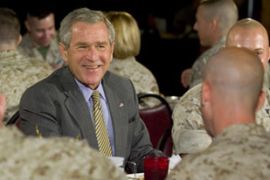Larger US troop pull-out ‘possible’
US defence secretary says five more brigades could withdraw from Iraq in 2008.

Published On 16 Sep 2007
In the report, ordered by congress, the White House concluded that the Iraqi government had made satisfactory progress on nine out of 18 political and security benchmarks.
Progress
The report outlined unsatisfactory progress in seven areas and said it had been unable to rate two others.
Democrats in control of the congress had insisted on a review of Iraqi efforts to achieve national reconciliation as a condition for continued funding for a build-up of US forces intended to help curb sectarian violence.
|
“Iraq is still under foreign occupation and Iraqis continue to die in great numbers” albaghawy, Luxembourg |
Bush on Friday cited enough progress in Iraq to justify a limited withdrawal of US troops through the first half of 2008.
Under the plan by General David Petraeus, the US commander in Iraq, five combat brigades and several marine units would be withdrawn by mid-July.
That would bring US troop levels in Iraq to those before the so-called surge.
Gates said he hoped Petraeus would be able to recommend an additional withdrawal of about five combat brigades – somewhere around 20,000 more troops – in the second half of next year.
He said: “My hope is that when he does his assessment in March … General Petraeus will be able to say that he thinks that the pace of drawdowns can continue at the same rate in the second half of the year as in the first half of the year.”
Speaking at a Pentagon news conference, Gates cautioned that any withdrawal of US forces would depend on conditions in Iraq.
But asked if withdrawing another five combat brigades in the second half of next year would leave roughly 100,000 troops in Iraq in January 2009, Gates replied: “That would be the math.”
A combat brigade ranges from 3,000 to 5,000 troops and the US currently has 20 brigades in Iraq. Withdrawal of combat brigades normally would be accompanied by a reduction in various support forces.
Transition
Gates cast the troop-reduction plan as the start of a transition in the US mission in Iraq.
He called on Democrats, who have sought a faster withdrawal, to support Petraeus’ plan and cautioned against proposals from some legislators that would reduce the number of troops available for deployment to Iraq.
Specifically, Gates listed problems with a measure from Jim Webb, Democratic senator of Virginia, to give troops more time off between tours of duty.
That, the secretary said, would require the military to extend tours of duty for units already in the war zone.
“It is fully to be expected that the administration would oppose this amendment,” Webb said after Gates’ comments. “The intention of the amendment is to rectify an inequity brought about by administration policies.”
Gates had offered little indication of his thoughts about the next stage of the more than four-year-old war before Petraeus presented his recommendations to Congress this week.
Objectives identified
On Friday, Gates identified his objectives, saying the next phase had to secure gains made by the build-up of US troops this year and send a signal that the US would remain “the most significant power” in the Middle East over the long term.
Gates also offered a vision of the future role of US forces who stay in Iraq over the long term. He said their mission would include “counter-terrorism activities” and support and training for Iraqis in border control operations.
He also said the next steps in Iraq had to “avoid even the appearance of American failure or defeat in Iraq”, warning that if al-Qaeda could claim victory in Iraq, it would embolden them.
“I believe it would empower them worldwide far, far more than their victory over the Soviets,” said Gates, a career Soviet expert at the CIA.
“The regional consequences would be significant and highly destabilising.”
Source: News Agencies
